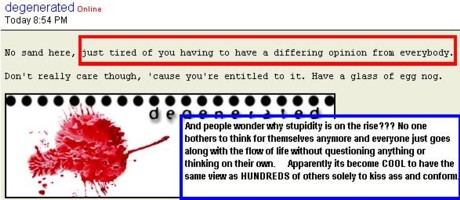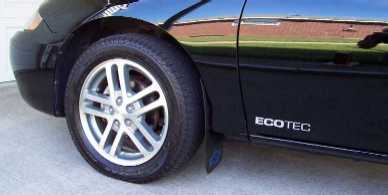C.T.S wrote:Manitoba Motorsports wrote:honestly, 0.8microns i wouldnt worry about too much myself lol, maybe over long periods of time but then again i've run race cars for years with no filters, not saying go ahead and do it, but its not something i will lose sleep over. This debate about How K&N's filtering is lacking has been going on for years now, but the company is bigger and better than ever. they must be doing something right.
I think you've got the best arguement. That's a damn small particulate size. I'm really not worried about anything that small.
I also have to agree with Jimmyz. Sounds like advertising FUD. Basically they ran tests untill they found one particular test where they are better than K&N, then they hype that one test like it's the most important.
If you want to convert people you'll need the same graphs at many different particulate sizes. Also how about some qualifications for those flow numbers. Like what kind of air? Don't laugh either! Companies contort facts like what "air" is made of to make their numbers look better all the time.
+1
its always been fact that any guaze style filter will filter the most when compared to foam.
paper is basically non reusaeable.
foam and guaze are durable enough to be cleaned, foam flows more, but also disrupts air velocity when particles you CAN NOT clean out get stuck inside. hence the reason mushroom filters are cheap and most now are rebuildable where you keep the base, but replace the foam element.
guaze, is cleanable to where small particles do not get jammed deep within a thick medium. oil is used on some filters, which can help with filtration, but also slow up air flow a small bit.
now this isnt going against facts, for most people this SHOULD be common sense logic.
wet filters which means filters that have been soaked or overoiled will not do the job right. K&N makes this disclaimer CLEARLY in their filter cleaning kits.... DO NOT OVER OIL.....so if amsoil claims its a wet guaze, then it leads anyone to believe they didnt do it right. which is starting to be normal in every company claiming they are the best at this and that.
leading to most companies mottos: lie your ass off, test till one product outperforms our comps product, some idiot will believe us and buy our products without using common sense....
sadly some filters have been tested new, against old used filters, which was pointed out in automobile or motor trend... one of the magazines i now subscribe to...
and as someone has said,
0.8 microns? who's engine, especially a performance engine doesnt have the combustion to eradicate something of so little in size???? thats if in fact the amsoil filter actually in installed correctly as it has a few warnings on installing and caring for it...
bottom line, almost any filter, if maintained will be effective. if someone is going for 25,000 miles without cleaning a filter, then they really arent performance oriented to begin with. nothing personal to anyone who do.... even i have done it at times... but when i do autocross for the few months a year i do it, the filter is cleaned every other event. this is basically a product for people who want to "set it and forget it"
theres no way this filter will be on for 25K and hold more dirt on a surface area and then any other filter, ANNND still give more air flow than a freshly cleaned and installed filter. unless its a paper filter, or stock which is REALLLLLY restrictive.
even amsoil made the statement on THEIR PAGE
Quote:
Holds More Dirt
A filter?s ability to contain trapped contaminants determines how well an engine will run and how long the filter will remain effective. If the capacity is too low, the filter will have to be replaced constantly. When the filter is full, air cannot pass through at the rate necessary for proper engine performance.
basically this states the more dirt your filter can hold, the longer you can go without cleaning it.
however the next paragraph states:
Quote:
AMSOIL Ea Air Filters hold up to five times more contaminants than cellulose air filters. Since the nanofibers in the media are so small there are more pores per square inch, allowing for higher dirt-holding capacity and lower pressure drop when compared to cellulose filter media alone. Thinner media fibers produce more uniform pore size distribution, improving the filter?s overall quality and ability to capture and retain particles. Testing shows that Ea Air Filters hold 15 times more contaminants than a wet gauze type filter. The capacity is so great, in fact, that the new AMSOIL Ea Air Filters remain effective for a full 25,000 miles or one year before cleaning. This coincides with the AMSOIL 25,000-mile/one-year motor oil drain interval, adding even more convenience for motorists by consolidating routine maintenance.
to start: 25K or ONE year? most people do around 10-15k yearly. unless you travel alot. like X country. they also do not account for dusty areas in their tests, which i do believe is in the K&N section of care. granted its common sense, it really makes you think where the tests were done....REAL WORLD or in a LAB with a diet Tab sitting next to the computer....
onwards....
5 times more than a foam filter
15 times more than a guaze filter....
as i pointed out above, a gauze filter has less room for particles to get stuck in in comparison to foam which has deep bubble like holes, and also causes air flow disruption.
but then they go on to say, 15 times MORE than a guaze filter??? the only reason one would let a filter ACHIEVE 15 times MORE dirt and debris, is for longevity between cleaning. and think, with all that extra dirt, its not gonna flow nearly as good as a maintained filter.
size for size, the surface area of the filtration will determine how much air flows in a filter, the medium will matter as well, but guaze flows high, as well as foam, and prob the nano fiber... and Stainless steel for those who have these as well.
two filters of the same size and dimensions will flow similar in most ofthe cases aforementioned....similar to the point of both cars will be as effective, or the same car will be as effective with either filter.
basically the amsoil filters, like their oil filters are more for a longevity ordeal, rather than performance.....which is amsoils claim to fame of having filters than can go for 7k as opposed to most normal filter which only last to 3-4k which is when most people change their oil. when amsoil came out with a synthetic to last longer than 7-9k, they needed a filter to go along with.
amsoil has a good product, so does k&n and many other filters on the market.... but really the only claim to fame here is longevity. and as said if you are waiting 1/4 of 100k to change a filter, you arent worried about performance and maintainence as much as someone who races or concerned about performance.
also for such a well known company....you think they could have done some CFM tests and actually logged REAL data, instead of what they did show on their webpage....
i guess i also shouldnt point out that on a DIFFERENT page on the same site, they stated:
Quote:
More Capacity
AMSOIL Ea Air Filters hold up to two and a half times more contaminants than cellulose air filters.
http://www.amsoil.com/storefront/eaa.aspx
but remember, on this page
http://www.bestsynoil.com/filters_filtration/amsoil_air_filters/amsoil_eaa_air_filters_ac.htm
they stated:
Quote:
AMSOIL Ea Air Filters hold up to five times more contaminants than cellulose air filters
SAME EXACT PRODUCT, Different claims.... hard to trust any data from a company that puts out inconsistent claims..... a lil research goes a hella long way.



















.



